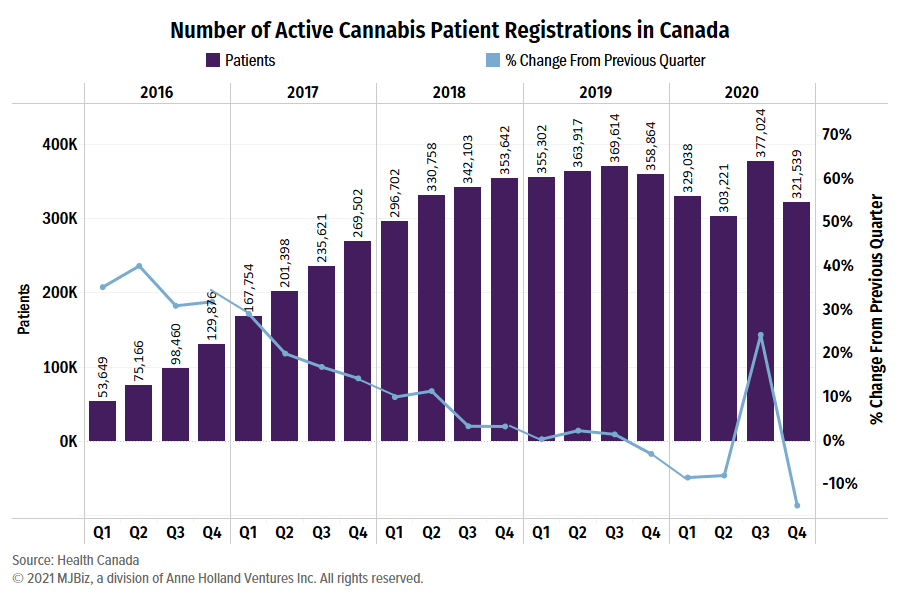Canadian cannabis companies formally cried foul about their rivals’ business practices nearly 200 times last year, the highest number of complaints lodged with Health Canada in years and nearly double 2019 levels.
Experts say the rising number of complaints might stem in part from cutthroat competition in the industry, which could be spurring companies to push the envelope from a regulatory standpoint and rivals to blow the whistle to stop the practice.
At the same time, experts say, regulators have been inconsistent in enforcing rules that are, at times, unclear.
Roughly 182 complaints were lodged with Health Canada by regulated parties in the cannabis industry about competing parties in 2020, Health Canada told MJBizDaily.
That’s almost double the previous year’s 97.
David Hyde, CEO of Hyde Advisory & Investments in Toronto, said businesses are getting squeezed and are looking to be creative in a way that allows them to be more commercially successful without crossing over the regulatory red line.
But what is and isn’t allowed isn’t always clear.
“More and more companies are realizing that they can take a little bit more of a flexible view of how they can navigate that regulatory path in difficult, competitive times, and they’re willing to take a little bit more risk in that way,” he said.
“That is a big reason why we’re seeing more (businesses) push the boat out a bit further in areas where they didn’t before. Then other (competing) licensed producers are seeing that and they want to shut it down – they don’t want other businesses on an uneven footing or doing things they believe they can’t do.
“So you see an uptick in complaints for that reason.”
Secret enforcement
Health Canada utilizes various enforcement tools when dealing with potential regulatory violations, ranging from warning letters and phone calls to license revocations.
However, those letters are not disclosed to the public, so businesses don’t know where other businesses crossed the line with the rules.
Health Canada discloses the fact that letters were issued, but usually not until years after the fact.
For instance, the most recent compliance and enforcement report published by Health Canada covered a period that started 2½ years earlier.
Some industry sources would like compliance letters released publicly so businesses can have a better idea of what will and won’t be tolerated by the regulator.
“The missed opportunity is for the rest of the industry to learn from how Health Canada has applied certain sections of the Cannabis Act and the regulations to certain situations, because we could have taken that interpretative guidance and applied it to other situations,” said Trina Fraser, a partner at Brazeau Seller Law in Ottawa, Ontario.
“We’re all missing a learning opportunity when at least the substance of those letters, even if the names weren’t attached to them, is not shared (with) the entire industry.”
Fraser, who leads the firm’s cannabis practice, said some clients are frustrated with a lack of clarity on the application of certain rules.
“They will often see many other license holders doing what they were told they couldn’t do. That leads to this perception of competitive advantages and probably leads to intraindustry complaints,” she said.
She cited as examples rules involving promotion, packaging, labeling and Good Production Practices compliance.
“The needle is always moving as the industry continues to innovate, and as the industry innovates it’s often doing so in a way that wasn’t specifically contemplated by the drafters of the act and the regulations,” she said.
“We’re often, as advisers, having to go to Health Canada asking for guidance on how certain novel situations would be interpreted by Health Canada as being in compliance or not with the act and the regulations.
“I think a more robust system to get definitive answers would be helpful.”
Interpretations of rules vary
Cannabis regulations are complex and can be interpreted in different ways by different businesses, experts say.
That can cause some businesses to file complaints against competitors over perceived regulatory violations.
“The reality is, very often there are nuances to the interpretations that are taken, and one company may be better positioned to defend their interpretation versus the next company,” Hyde said.
Fines are another issue.
Health Canada has not issued fines – known as administrative monetary penalties – to any cannabis business since recreational legalization in late 2018, the regulator previously told MJBizDaily.
Businesses weigh risk against reward, Hyde said, and they know that Health Canada has issued no financial penalties for even the most egregious violations.
“Human nature is risk versus reward. That calculation is impacted by the anticipated negative impact that can flow if you take a risk and get caught,” he said.
“If the regulator is overly punitive, it can be problematic for the industry, but if it’s not as punitive as it should be, then it can almost embolden and change people’s risk calculations, which can get them onto thin ice.”
Matt Lamers is Marijuana Business Daily’s international editor, based near Toronto. He can be reached at mattl@mjbizdaily.com.




